As the media landscape continues to evolve, Lionsgate finds itself at a critical juncture with its anticipated separation of Lionsgate Studios and Starz. This strategic split, expected to occur later this spring, highlights the company’s response to ongoing shifts in consumer behavior, particularly within the streaming sector. CEO Jon Feltheimer has indicated that this decision aligns with industry trends aimed at harnessing the strengths of each brand.
The separation process has not been as swift as many stakeholders had hoped. Feltheimer addressed the delays during a recent earnings call, noting that the company is still undergoing regulatory review of its joint proxy registration statement with the SEC. This is a critical step that involves meticulous oversight and adjustments to comply with financial reporting requirements. The need to update these documents with December 2024 financials implies a longer timeline than initially projected. As Feltheimer clarified, a shareholder meeting is likely to take place by mid to late April, necessitating a thorough review and approval from the SEC beforehand. This highlights the complexities of corporate restructuring, especially in a heavily regulated industry.
While these delays may be frustrating for investors and executives alike, they also serve as a reflection of the intricacies involved in such major organizational changes. The financial reviews not only ensure compliance with regulatory standards but also provide the necessary groundwork for a robust separation that protects shareholder interests.
The imminent division between Lionsgate Studios and Starz is not merely a bureaucratic shift; it represents a seismic shift in how both entities plan to navigate the future of media consumption. Feltheimer described this moment as an “inflection point” for the industry, suggesting that both companies have distinct pathways ahead. The focus on how Starz can leverage its existing assets—like bundled content and digital service offerings—will be crucial in capitalizing on the current disruptions within the media landscape.
As consumer preferences shift towards more personalized and diverse programming options, Starz is positioned to adapt by enhancing its service offerings. The ability to provide digital services to traditional linear platforms indicates a dual-pronged approach where the company can cater to a wide range of audiences. Meanwhile, Lionsgate Studios can focus on producing content that resonates with theatrical audiences, banking on its long-standing tradition of blockbuster franchises.
From a financial performance standpoint, Lionsgate’s television production arm showcased impressive gains during the third quarter of its fiscal year. With a significant 63% increase in revenue to $405 million, the production division has clearly benefited from a spike in episodic deliveries and increased licensing of library content. This growth is particularly notable given the recovery from previous industry strikes, demonstrating resilience in its business model.
Conversely, Lionsgate’s motion picture segment paints a different picture. The revenue dip from $443 million to $309 million signals challenges that the studio faced in the previous year, especially in comparisons with successful films like “The Hunger Games: The Ballad of Songbirds and Snakes.” However, the incremental increase in overall studio revenue suggests a recovering trajectory fueled by new releases like “Den of Thieves: Pantera” and “Flight Risk.”
Starz, while experiencing subscriber growth, showed a revenue decline, signaling potential hurdles in retaining its audience. The contrast between revenue growth and profit decline underscores the competitive pressures in the streaming space, where subscriber acquisition often translates to increased costs.
The strategic separation of Lionsgate Studios and Starz not only delineates the operational paths of these two entities but also encapsulates the broader dynamics at play within the entertainment industry. As streaming services become more entrenched in consumer habits, the effectiveness of these new standalone business structures will depend on their ability to innovate and adapt.
The announcement of a robust credit facility of $800 million for the newly independent Lionsgate Studios indicates confidence in its future endeavors. Both entities will need to sharpen their focus and harness their unique strengths to thrive in a crowded marketplace. The coming months will be pivotal as they establish themselves as distinct players, each with their own narratives and strategies in an evolving media landscape.
The anticipated separation is not merely a corporate shift; it signals a restructuring with profound implications for both Lionsgate Studios and Starz. As they forge their paths, how effectively they can adapt and respond to consumer demands will determine their success in an ever-competitive environment.



Leave a Reply